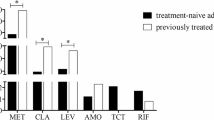Abstract
Clarithromycin resistance of Helicobacter pylori is a serious problem in eradication therapy. We investigated whether the use of maclorides (clarithromycin, erythromycin, and azithromycin) induces clarithromycin resistance in the organism. Twenty H. pylori strains were isolated from pediatric patients with gastrointestinal symptoms. The minimum inhibitory concentrations (MICs) of each macrolide antibiotic were determined by the Etest. Among these, 17 strains susceptible to macrolide antibiotics were used for the in vitro induction of drug resistance. In each of these 17 strains of H. pylori, 30-day exposure to clarithromycin in experiments for in vitro induction did not change the MIC of any antibiotic, nor did it induce either the A2143G or the A2144G mutation in the 23S rRNA gene. These results suggest that the use of macrolide antibiotics does not induce clarithromycin resistance in H. pylori by 23S rRNA gene mutation.
Similar content being viewed by others
Author information
Authors and Affiliations
Corresponding author
About this article
Cite this article
Fujimura, S., Kato, S., Iinuma, K. et al. In vitro exposure to macrolide antibiotics in Helicobacter pylori strains isolated from children. J Infect Chemother 10, 128–130 (2004). https://doi.org/10.1007/s10156-004-0300-z
Received:
Accepted:
Issue Date:
DOI: https://doi.org/10.1007/s10156-004-0300-z




